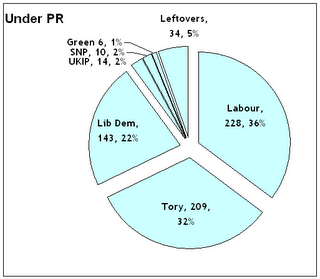We have this strange voting system in the UK which means that the number of MPs a party gains represents the number of areas won rather than the proportion of the electorate that supports them. This can lead to rather odd results. The great reforming Labour government of 1945 won deep support around the country and created a consensus across the political spectrum on the NHS, full employment and other important matters.
This can lead to rather odd results. The great reforming Labour government of 1945 won deep support around the country and created a consensus across the political spectrum on the NHS, full employment and other important matters.
But this government ended in electoral defeat to the odious Winston Churchill in 1951, despite increasing the numbers of people who voted for it. Of course it has worked the other way too, where Labour has won elections despite getting a lower share of the vote (1974).
Okay, okay - it's all an excuse to do pie charts. But if you look at the two pics you'll see first the number of MPs each party has and the percentage of the Commons that relates to. Then compare this to how many MPs this would have been if people had been elected under a proportional representation system. Instead of an absolute majority Labour would only have been slightly larger than Tories and the "others" would have increased their share, including BNP, Plaid, SSP and independents - although Respect would still have one MP.
Then compare this to how many MPs this would have been if people had been elected under a proportional representation system. Instead of an absolute majority Labour would only have been slightly larger than Tories and the "others" would have increased their share, including BNP, Plaid, SSP and independents - although Respect would still have one MP.
Of course it's important to note that people's voting patterns would be likely to change dramatically. Many people refuse to "waste their vote" - which not only means that smaller organisations like the Greens lose out but also across 80% of the country its not worth voting for one of the major parties either.
These figures are based on the idea of a national PR, although it would be far more likely for any PR system that was introduced would be regional lists rather than national ones - which I think would increase the representation of Plaid, SNP, SSP and other regional alternatives - it would certainly guarantee their presence.
Local PR systems
Cambridge used to have a Tory MP and is a relatively wealthy area but it doesn't have a single Tory councilor any more because the 15 - 20% they consistently get across the city is not concentrated in any single area. It's perfectly acceptable to me for the council chamber to be a Tory free zone but we can't pretend this is democratic representation either.
In Scotland local elections next year will be conducted on a PR basis and it will be interesting to see what effect this has on the shape of councils - although it's certainly a worry that the SSP may well not be in a position to capitalise on the change.
But any democratisation of the country's institutions could not possibly ignore the House of Lords (and the Monarchy). Billy Bragg has been promoting an interesting system which would not require voters to change the mechanics of the way they vote.
His scheme would be to vote as normal for your local MP but that vote would feed into a regional list system that would elect the (renamed) House of Lords. I'm rather attracted to this system for its simplicity, its attempt to get the best of both worlds and that fact it's advocated by in an Essex accent.
The big drawback for me of any PR system would be the loss of the "Portillo moment" that ability of electors to overthrow particularly obnoxious overlords - but you can't have everything I suppose. I do think socialists should argue for democratic reform, and I believe in democracy in the sense that power should rest with the people, but the argument can't end here. First of all the most important part of any political system is its content - what it does and argues for. In my view, no matter where we find ourselves we should be arguing for progressive values and principles and using every avenue to do so - including Parliament - which means we can't confine ourselves to systems no matter how progressive or experimental they might be.
I do think socialists should argue for democratic reform, and I believe in democracy in the sense that power should rest with the people, but the argument can't end here. First of all the most important part of any political system is its content - what it does and argues for. In my view, no matter where we find ourselves we should be arguing for progressive values and principles and using every avenue to do so - including Parliament - which means we can't confine ourselves to systems no matter how progressive or experimental they might be.
Secondly, and just as important is about participation. You'll occasionally hear Labour or Tory politicians whining about levels of political participation - but I think their argument besically boils down to moaning about the fact people are not interested in what they are doing. We need a society where people can directly influence what is going on - we can't simply rely on representatives.
These are not mutually exclusive. In Brazil where radical PT groups got hold of local government they tried to push the idea of 'participatory budgets' and community forums. Exciting stuff, derailed by a distinctly non-radical PT government getting in and licking the mucky boots of neo-liberalism.
The struggle for democratising society is an important one and I'd love to see a real movement grow that promotes arguments on all these areas - but wherever it goes it cannot afford to become an idea about tinkering with the bus timetables of capitalism whilst the injustices go on unopposed.
Some links:
- I wrote this Against Proportional Representation which argues against a closed list system of PR.
- Declan O'Neill wrote an excellent response Against First Past the Post which I largely agree with.
- Elect The Lords is the respectable campaign for an elected second chamber
- Make my vote count argues for PR for the House of Commons

1 comment:
Ro see the pie charts more clearly - click on them
Post a Comment